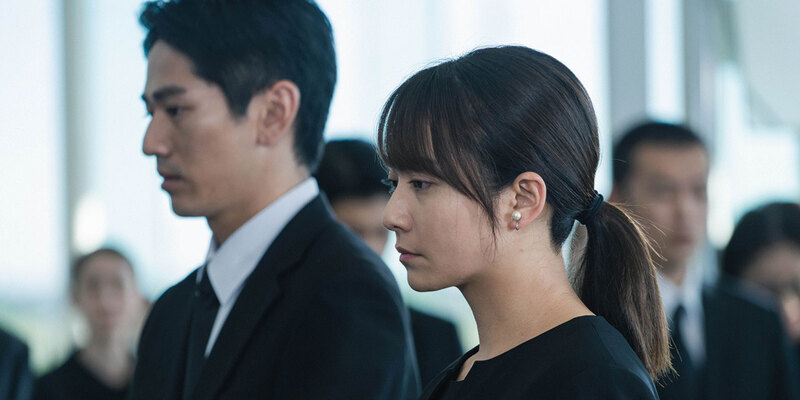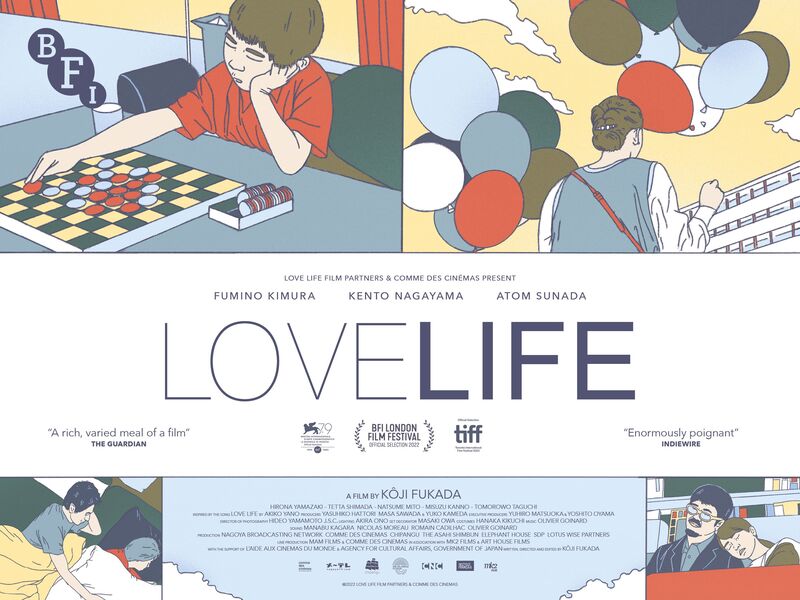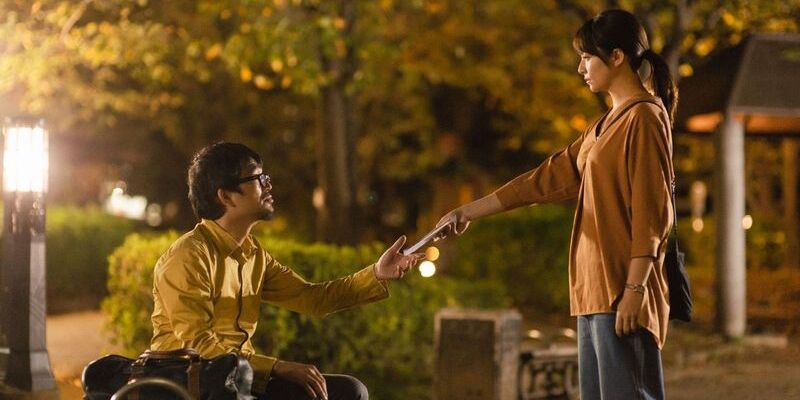
Review by
Eric Hillis
Directed by: Koji Fukada
Starring: Fumino Kimura, Kento Nagayama, Tetta Shimada, Atom Sunada,
Hirona Yamazaki

A Koji Fukada movie centred on a devastating incident involving
a child and the burgeoning relationship between a quietly unhappy wife
and a taciturn man who may not have her best interests at heart –
haven't we seen this one already? While Fukada's latest,
Love Life, shares some key plot elements with his masterpiece of misery,
Harmonium, the two films couldn't be further apart in tone.
Harmonium is a grim but rewarding film about the cruelty
life sometimes inflicts on those who least deserve it.
Love Life is essentially treading the same ground but it
does so with a full, if heavy heart. With its melancholic humour, tinkly
piano score and profound human insight, Fukada's latest might be
mistaken for the work of his compatriots Hirokazu Kore-eda or Naomi
Kawase.
Ever since Ozu's teapot, film scholars have been keeping an eye out for
the use of specific props in Japanese films. Fukada presents us with one
for the ages here in the form of a compact disc hung outside the
apartment of our protagonists. The disc reflects the sun in a manner
that is utilised to brilliant effect in a revelatory scene later on, but
as the movie opens it's simply casting dappled light into the living
room of young couple Taeko (Fumino Kimura) and Jiro (Kento Nagayama), which they share with Keita (Tetsuda Shimada), Taeko's
eight-year-old son from a previous marriage to Park (Atom Sunada), a deaf Korean immigrant who abandoned his wife and son four years
prior.

It should be a day of celebration. Keita has won a regional
championship in the boardgame Othello, and it's the 65th birthday of
Jiro's father, Makoto (Tomorowo Taguchi). The celebrations are
tempered, first by a cruel metaphor deployed by Makoto regarding the
inferiority of second hand fishing reels directed at Taeko, and then by
the death of Keito, who knocks his head and drowns in the bath Taeko
forgot to drain.
The immediate scenes make for starkly realistic depictions of those
difficult days in the wake of a loss. There's no rule book for how one
should behave or grieve at such a time, but everyone has their own
ideas. Previously an ally to Taeko, Jiro's mother (Misuzu Kanno)
is horrified at her daughter-in-law's desire to bring the boy's body
home for a night. Surprisingly, it's Makoto who defends Taeko's wishes.
Tellingly, Jiro just stands by uselessly.

When Park makes a surprise and traumatic appearance at his son's
funeral, it leads Taeko to reconnect with her former husband. At first
she tells herself it's simply for professional reasons. Taeko is a
social worker and the only one who can communicate with Park through
Korean Sign Language in order to process his benefits – in an ironic
case of nominative determinism, he's been living in a park for the last
two years. But the act of speaking in this way reminds Taeko of the
unique relationship between herself, Park and their late son. Early on
we witness a playful moment in which Taeko and her boy speak in KSL to
make a joke at Jiro's expense, and as the film progresses Jiro is once
again shut out as Taeko and Park speak a language he isn't privy to.
This leads Jiro to reconnect with a past lover himself.
Love Life is the very opposite of what might reductively
be labelled a "message movie." There's nothing didactic here, no
instructions imparted to the viewer from a wise filmmaker. Rather Fukada
knows that life is messy and sometimes there simply aren't any ready
made answers. With the exception of Taeko, practically every character
performs an action or gesture at some point that threatens to signify
them as the villain of the story, only to redeem themselves a couple of
scenes later. Everyone is a trainwreck, unable to figure out how to deal
with the situation that's unexpectedly presented itself. All that is,
save for Taeko, who refuses to move forward and instead embraces her
grief. In an understated but affecting scene, Taeko clings onto her
son's Othello board during a minor earthquake, determined that its
pieces remain in place from the final game she played with the boy.
She's unable to take a bath until she's accompanied by the silent but
oddly comforting Park. While those around her tell her she needs to move
on, Park is wise (or manipulative) enough to tell her the
opposite.

The disabled have been ill-served when it comes to screen
representation. They're usually portrayed as pathetic at worst, angelic
at best. Park marks a giant leap forward in terms of how disabled people
might be represented. He's certainly not pathetic, even if Taeko is
convinced he can't function without her, and he's far from angelic. He's
as messy and duplicitous as anyone else. It shouldn't feel revolutionary
that a movie dare to portray a disabled person as layered and difficult
to read, yet this is how it feels to watch Park act as a curious blend
of antagonist and saviour.
I've often felt Japanese dramas have much in common with classic
Hollywood westerns, particularly those of John Ford. They're both
populated by people who can't express their emotions, who often bury
themselves in their work to escape emotional pain. In the western, key
dialogue scenes often play out on horseback, allowing for a lack of eye
contact, and many Japanese filmmakers stage their own key scenes with a
similar parallel staging. Fukada seems to pick up on this when Jiro's
ex-lover remarks about how he never looks anyone in the eye when he
speaks. Another western trope is brilliantly repurposed here when the
camera follows Taeko from her office across the street to the building
where Park is seeking help, reminding us of all those climactic
set-pieces in which the western hero crosses the dusty street to meet
his fate head-on (John Carpenter did this to great effect at the climax
of
Halloween). As East meets West in this fashion we're reminded that love and life
are universal, and while we sometimes might wish to avoid them as
obstacles, we need to face them both down if we're to carry on.


